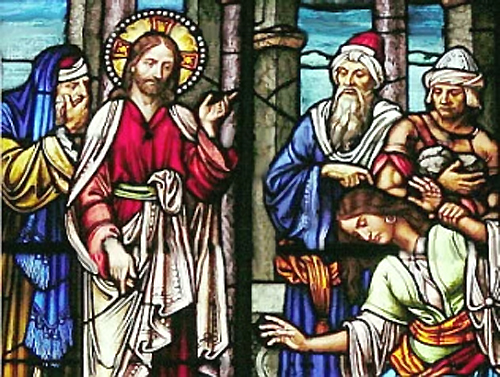Christian Art | Love Revealed By Jesus Christ | Increase My Faith
Faith is not merely a passive acceptance but an active trust in God’s promises. It is a dynamic and living aspect of our relationship with God. When we face life’s challenges, our faith can be tested. These tests are opportunities for growth, allowing us to deepen our reliance on God.
Gospel Reading: Luke 17:5 (KJV)
‘And the Apostles said unto the Lord, Increase our faith.’
Reflection On The Gospel
In this verse, the Apostles recognize their need for greater faith and turn to Jesus, asking Jesus to increase their faith. This expresses understanding that faith is a divine gift that can be nurtured and grown through God’s grace. The Apostles ’ humble plea is a powerful reminder that we can seek to strengthen faith by relying on Jesus in prayer.
Reflection On Failure Of Faith
There are moments in life when faith might falter. These times of doubt and struggle can make Christians feel distant from God. It is important to remember that experiencing doubts does not mean we have failed in faith; rather, it is a natural part of spiritual journey. Even the greatest saints have faced moments of doubt and uncertainty.
Pope Francis has spoken about the reality of doubts in our faith journey. He has said: ‘Who among us has not experienced insecurity, loss, and even doubts on their journey of faith? It is part of the journey of faith; it is part of our lives.’ Pope Benedict XVI also addressed this, stating: ‘The trials of life, while helping us to appreciate the beauty of faith, also enable us to experience moments of spiritual emptiness. This is a condition shared by believers and non-believers alike, and it can become a call to seek God.’
Prayer
Heavenly Father, I come to you today with a heart seeking deeper faith. I acknowledge the times when my faith has wavered, and I have felt distant from you. Just as the Apostles asked Jesus to increase their faith, I ask you now to strengthen mine. Help me to trust in your love and guidance, especially in times of doubt and uncertainty. Fill my heart with the assurance of your presence and the confidence that you are always with me. Thank you for your unending grace and mercy. In Jesus’ name, I pray. Amen.
Personal Reflection
I think about a time when my faith was tested. What circumstances led to my doubt or uncertainty? How did I feel during that period, and what helped me to overcome those feelings? Reflecting on these experiences helps me understand that doubt is a natural part of my faith journey and that seeking God’s guidance can lead me back to a place of trust and belief.
Meditation On The Prayer And Gospel
The Apostles’ request for increased faith in Luke 17:5 is a powerful example of humility and reliance on Jesus. They recognized their limitations and turned to Jesus for help. This act of turning to Jesus is crucial in my own life, especially when I face challenges that test my faith.
I consider the story of Peter walking on water (Matthew 14:22-33). Peter’s faith allowed him to step out of the boat, but when he saw the wind and waves, he became afraid and began to sink. Jesus immediately reached out his hand to save Peter, saying: ‘O thou of little faith, wherefore didst thou doubt?’ This story illustrates that even in moments of doubt, Jesus is there to support me and strengthen my faith.
Reflecting on ways in which Jesus has been present in my life during times of trial, I can recall moments when I felt Jesus’ guidance and comfort. These experiences impact my faith, helping me understand Jesus’ role in strengthening my faith.
Faith is not merely a passive acceptance but an active trust in God’s promises. It is a dynamic and living aspect of my relationship with God. When I face life’s challenges, my faith can be tested. These tests are opportunities for growth, allowing me to deepen my reliance on God.
Consider the Apostle Thomas, who doubted Jesus’ resurrection until he, Thomas, saw and touched Jesus’ wounds. Jesus did not rebuke Thomas harshly but offered him the evidence he needed, saying, ‘Reach hither thy finger, and behold my hands; and reach hither thy hand, and thrust it into my side: and be not faithless, but believing.’ (John 20:27 KJV) Thomas’ encounter with the risen Christ transformed his doubt into a profound declaration of faith: ‘My Lord and my God!’ (John 20:28 KJV)
Pope Benedict XVI wrote: ‘Faith, which sees the love of God revealed in the pierced heart of Jesus on the Cross, gives rise to love. Love is the light—and in the end, the only light—that can always illuminate a world grown dim and give us the courage needed to keep living and working.’
Pope Francis said: ‘Faith is born and reborn from the encounter with Jesus, from experiencing his mercy which illumines all the situations of our life. We need faith, a living faith, that makes us see the greatness of God’s mercy.’

![]()
Personal Application
As I reflect on my journey, I identify moments when my faith was particularly strong or weak. What external and internal factors contributed to these experiences? How did I respond, and what did I learn about myself and my relationship with God?
Faith is a journey marked by both certainty and doubt. By turning to Jesus and seeking His help, I can navigate the challenges and grow stronger in my faith. Let me continually ask Jesus to increase my faith and guide me through every season of life.
Our Blessing
May the love of Christ fill my heart and strengthen my faith. May Gos’s grace empower me to trust in Jesus’ promises and seek his guidance in all things. May I go forth in love, extending hope and compassion to all I meet. Amen.








